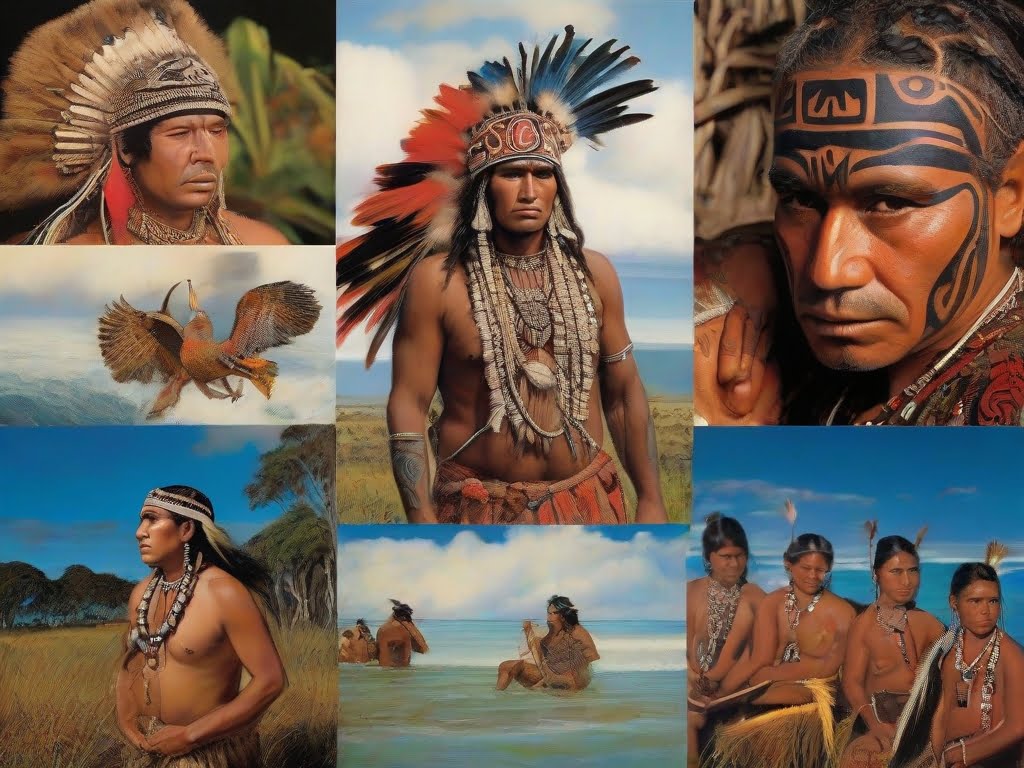Immerse yourself in the rich and diverse cultures of Aboriginal and Māori Indigenous peoples through this guide on cultural understanding and respectful engagement. Discover the beauty of these ancient traditions, learn about their unique customs and values, and explore ways to actively engage with the Māori and Aboriginal culture and communities. From traditional art forms to storytelling and traditional practices, this article will be your gateway to a transformative cultural immersion. Let’s embark on a journey of cultural appreciation and connection to the Aboriginal and Māori heritage together.
Table of Contents
ToggleUnderstanding Indigenous Māori and Aboriginal Cultures
Brief Overview of Aboriginal and Māori Cultures
Aboriginal and Māori cultures are deeply rooted in the history and traditions of Australia and New Zealand, respectively. These indigenous cultures have a rich heritage that spans thousands of years, and they continue to thrive today. Both Aboriginal and Māori people have unique customs, languages, art forms, and spiritual beliefs that shape their identities and way of life.
Cultural Significance and History
The history of Aboriginal and Māori cultures is essential to understand the significance they hold in their respective nations. Aboriginal people have inhabited the Australian continent for over 65,000 years, making them the oldest living culture on Earth. Māori people have lived in New Zealand for approximately a thousand years, and their arrival marked the beginning of a vibrant culture that is deeply intertwined with the land and sea.
The cultural significance of Aboriginal and Māori traditions lies in their connection to the land, spirituality, and community. These cultures offer unique perspectives on relationships with nature, kinship, storytelling, and art, which have shaped their communities for generations.
Traditional Customs, Beliefs, and Values
Aboriginal and Māori cultures share a strong emphasis on community, interconnectedness, and respect for ancestral knowledge. Both cultures place importance on oral traditions, storytelling, and the passing down of cultural practices from one generation to the next.
Aboriginal Dreamtime and Māori myths and legends are integral to understanding their customs and spiritual beliefs. These stories often explain the creation of the world, provide moral lessons, and guide their relationship with the natural environment.
Important values such as respect, reciprocity, and harmony with the natural world are deeply ingrained in both Aboriginal and Māori cultures. The concept of caretaking and protecting the land for future generations is central to their belief systems.
Importance of Cultural Immersion
Appreciating Cultural Diversity
Cultural immersion allows you to gain a deeper appreciation for the diversity of human experiences and ways of life. Engaging with Aboriginal and Māori cultures allows you to celebrate the unique heritage, traditions, and perspectives that these indigenous communities offer. By immersing yourself in these cultures, you can expand your worldview and develop a greater understanding of the world we live in.
Preserving and Promoting Indigenous Cultures
Cultural immersion is crucial for preserving and promoting the indigenous cultures of Aboriginal and Māori communities. By actively engaging and learning about their customs and traditions, you contribute to the preservation of their rich heritage. Furthermore, by sharing your experiences and promoting these cultures, you help raise awareness and ensure their longevity.
Building Respectful Relationships
Cultural immersion provides an opportunity to build respectful relationships with Aboriginal and Māori communities. By approaching these cultures with an open mind, willingness to learn, and respect, you foster meaningful connections. These relationships can lead to mutual understanding, collaboration, and contribute to the positive development of these communities.
Preparing for Cultural Immersion
Researching Aboriginal and Māori History and Culture
Before immersing yourself in Aboriginal and Māori cultures, it is essential to conduct thorough research. Learn about their histories, traditions, and contemporary issues. Familiarize yourself with significant cultural landmarks, events, and influential figures. This research will deepen your understanding and ensure that you approach cultural immersion with respect and sensitivity.
Learning Basic Language and Greetings
Learning basic phrases and greetings in the local Aboriginal and Māori languages is a sign of respect and appreciation. These efforts demonstrate your genuine interest in engaging with the culture and community. By learning how to greet others in their own language, you show that you value their traditions and are willing to make an effort to connect on a cultural level.
Understanding Cultural Protocols and Etiquette
Each community has its own set of cultural protocols and etiquette that should be respected and followed. These protocols may include rules around touching sacred artifacts, appropriate behavior during ceremonies, or the sensitive topics that should be avoided. Familiarize yourself with these protocols to avoid unintentionally causing offense and to show your commitment to cultural sensitivity.
Engaging with Aboriginal Communities
Residential and Cultural Tours
Participating in residential and cultural tours led by Aboriginal guides is an excellent way to immerse yourself in their traditions and gain valuable insights. These tours often include visits to sacred sites, storytelling sessions, bushwalks, and opportunities to learn traditional activities such as boomerang throwing or painting.
Participating in Traditional Ceremonies
With the guidance and invitation of the community, participating in traditional ceremonies can provide a deeper understanding of Aboriginal culture. These ceremonies may include dances, music performances, or initiation rites. It is essential to approach these ceremonies with humility, respect, and a willingness to learn.
Visiting Aboriginal Art Centers
Aboriginal art centers offer a unique opportunity to learn about and appreciate Aboriginal art forms. These centers are often community-owned and provide a space for artists to showcase their work. By visiting these centers, you not only support the Aboriginal art community but also gain insights into the cultural significance of various art forms, such as dot painting or bark painting.
Supporting Aboriginal-Owned Businesses
Supporting Aboriginal-owned businesses is a tangible way to contribute to the economic development and empowerment of Aboriginal communities. By purchasing products or services from these businesses, you help create sustainable livelihoods for Aboriginal people. This support can range from buying indigenous artwork, visiting indigenous-owned cafes or restaurants, or engaging with local Aboriginal tourism operators.
Engaging with Māori Communities
Marae Visits and Powhiri Ceremonies
A marae visit is an invitation into Māori communities and a significant cultural experience. Powhiri ceremonies are traditional Māori welcomes performed on maraes, where visitors are greeted, welcomed, and introduced to the community. These visits offer a chance to learn about the local whakapapa (genealogy), engage in traditional rituals, and share in Māori hospitality.
Learning Haka and Traditional Songs
The haka is a traditional Māori war dance that holds immense cultural significance. Learning the haka can be a transformative experience, connecting you to Māori ancestral traditions and expressions of identity, strength, and unity. Alongside the haka, there are other traditional songs and chants that are worth exploring to further understand the rich musical and cultural heritage of the Māori people.
Participating in Māori Art and Craft Workshops
Māori art and craft workshops provide a hands-on experience of the various art forms and techniques that have been passed down through generations. Engage in workshops that focus on traditional practices, such as wood carving, weaving, or bone carving. Not only will you gain new skills, but you will also deepen your appreciation for the intricate beauty and cultural significance of these crafts.
Exploring Māori Historical Sites
New Zealand is home to numerous historical sites that reflect Māori heritage and history. From ancient settlements to fortified pā (villages), these sites offer insights into the lives and traditions of the Māori people. Exploring these sites with knowledgeable guides will provide a deeper understanding of Māori history, their relationship with the land, and the struggles faced by their ancestors.
Respecting Sacred Sites and Cultural Artifacts
Understanding the Significance of Sacred Sites
Aboriginal and Māori cultures have various sacred sites that hold deep spiritual and cultural significance. These sites may include mountains, rivers, rock formations, or burial grounds. It is crucial to understand and respect the spiritual and cultural importance attributed to these sites by the communities. Adhering to any restrictions or protocols in place helps preserve the sanctity of these locations.
Seeking Permission and Guidance
When visiting sacred sites or engaging with cultural artifacts, it is vital to seek permission and guidance from the local Aboriginal or Māori communities. This respect acknowledges their custodianship and ensures that you are acting in line with their cultural values and protocols. By seeking permission, you honor the importance of their knowledge, traditions, and connection to the land.
Proper Handling and Photography Etiquette
When interacting with cultural artifacts or visiting sacred sites, it is crucial to handle them with care and respect. Follow any guidelines or protocols provided by the community members. Additionally, be sensitive when taking photographs, ensuring that you do not capture images of sacred objects or ceremonies without appropriate consent. Remember, your actions should always be guided by respect and responsibility.
Challenging Stereotypes and Cultural Appropriation
Recognizing and Addressing Stereotypes
Stereotypes can perpetuate harmful beliefs and misconceptions about Aboriginal and Māori cultures. It is essential to recognize and challenge these stereotypes by seeking accurate information and engaging in meaningful conversations. Educating others about the diversity and depth of these cultures can help dispel stereotypes and foster a more inclusive and respectful society.
Understanding the Harmful Impacts of Cultural Appropriation
Cultural appropriation occurs when aspects of a culture are borrowed or used without understanding or respect for their cultural significance. It is crucial to understand the harmful impacts of cultural appropriation on Aboriginal and Māori communities. By respecting and honoring their traditions, we can ensure that cultural practices remain sacred and protected.
Engaging in Ethical and Responsible Practices
When engaging with Aboriginal and Māori cultures, it is important to adopt ethical and responsible practices. This includes acknowledging and respecting the ownership and intellectual property rights of indigenous artists and creators. Prioritize purchasing authentic artworks and supporting local indigenous initiatives to ensure that Aboriginal and Māori communities benefit from their cultural heritage.
Supporting Indigenous Organizations and Initiatives
Learning and Supporting Indigenous-led initiatives
Supporting indigenous-led initiatives is an impactful way to contribute to the well-being and empowerment of Aboriginal and Māori communities. By researching and learning about these initiatives, you can understand how to actively support causes and organizations that address indigenous rights, health, education, and cultural preservation. Donating time, skills, or resources to these initiatives can have a lasting positive impact.
Financially Contributing to Indigenous Communities
Financial contributions are crucial in supporting the economic self-determination of Aboriginal and Māori communities. Consider donating to indigenous-run businesses, purchasing indigenous artwork, or supporting indigenous tourism ventures. These actions help create sustainable livelihoods and promote economic growth within these communities.
Promoting Indigenous Art, Music, and Literature
Indigenous art, music, and literature are powerful expressions of culture and provide a platform for indigenous voices. Supporting and promoting indigenous artists, musicians, and authors allows their work to reach a wider audience, fostering a greater appreciation and understanding for Aboriginal and Māori cultures. Attend art exhibitions, purchase indigenous music, and read literature authored by indigenous writers to support their creative endeavors.
Promoting Cultural Education and Awareness
Integrating Indigenous Histories into School Curriculums
Educational institutions play a vital role in promoting cultural education and awareness. By integrating indigenous histories and perspectives into school curriculums, students can develop a deeper understanding and respect for Aboriginal and Māori cultures. Incorporating indigenous knowledge systems, stories, and traditions within the educational framework fosters empathy, cultural diversity, and creates a more inclusive society.
Raising Public Awareness through Events and Exhibitions
Public events and exhibitions provide platforms for highlighting and celebrating Aboriginal and Māori cultures. Organizations, local governments, and community groups can organize cultural festivals, art exhibitions, film screenings, and panel discussions to promote understanding and appreciation of indigenous cultures. By attending and supporting these events, you contribute to raising public awareness and creating a more inclusive society.
Supporting Indigenous Cultural Centers
Indigenous cultural centers contribute to the preservation and promotion of Aboriginal and Māori cultures. These centers act as hubs for cultural exchange, education, and community engagement. Supporting indigenous cultural centers through donations, volunteering, or participation in their programs is a tangible way to contribute to the vibrancy and resilience of these cultures.
Building Long-Term Relationships and Partnerships
Respecting and Nurturing Connections
Building long-term relationships with Aboriginal and Māori communities requires respect, patience, and reciprocity. Engage in ongoing learning, listen to community voices, and approach relationships with humility. By nurturing connections based on mutual trust and understanding, you can contribute to meaningful collaborations and partnerships.
Promoting Collaborative Projects and Exchanges
Collaborative projects and exchanges allow for a sharing of knowledge, skills, and experiences between indigenous communities and the wider population. By actively promoting and participating in these projects, you foster cross-cultural understanding and create opportunities for mutual growth and development.
Empowering Indigenous Voices and Leadership
Empowering indigenous voices and leaders is essential for ensuring indigenous communities have agency over their own cultural preservation and development. By amplifying indigenous voices, promoting their leadership roles, and advocating for their rights and aspirations, you can contribute to a more equitable and inclusive society.
In conclusion, cultural immersion is an invaluable experience that allows you to understand, appreciate, and engage with the rich and diverse Aboriginal and Māori cultures. By respecting their traditions, supporting their initiatives, and promoting cultural education and awareness, you can contribute to the preservation and empowerment of these indigenous communities. Remember, building respectful, long-term relationships is at the heart of engaging with Aboriginal and Māori cultures.




